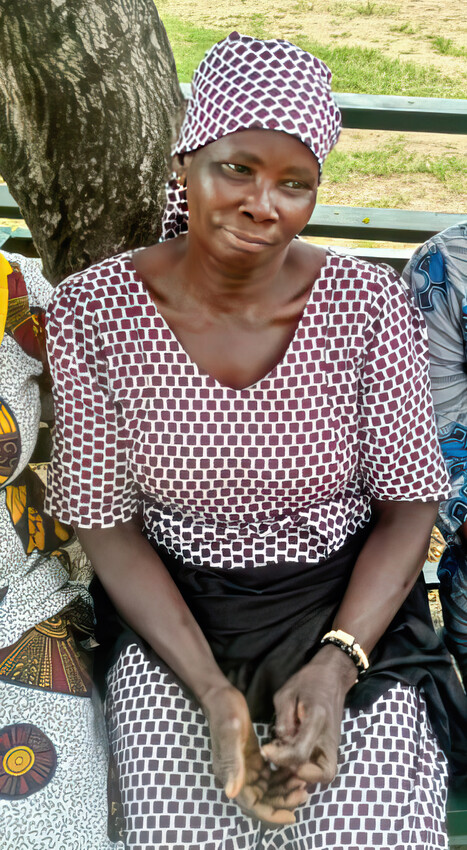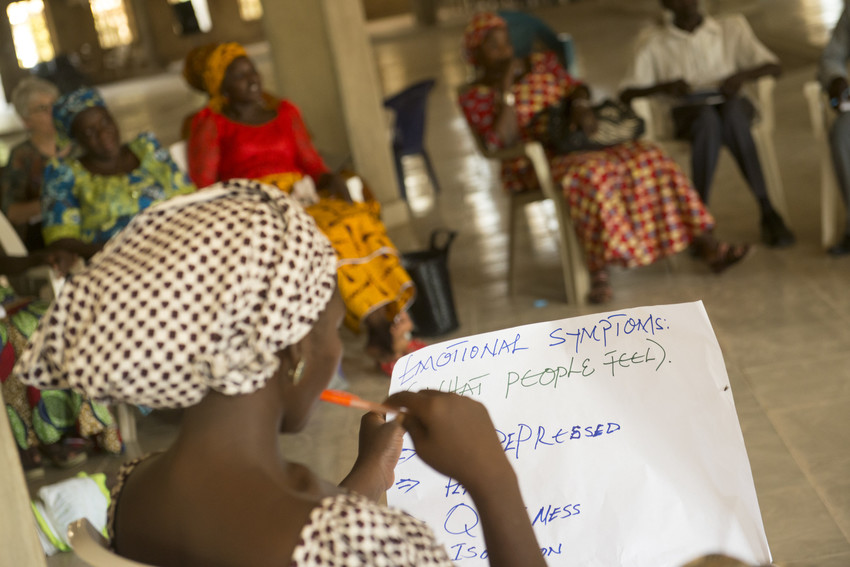Healing when trauma builds up
The need for trauma healing workshops increases as people in northeastern Nigeria are attacked and displaced again and again.
Editor’s note: The names of the survivors in this story have been changed for their protection. Please note that content in this story may be disturbing to some readers. Photos are courtesy of MCC staff and partners.
In 2020, Boko Haram fighters killed seven people in Elizabeth Yoha’s village in northeastern Nigeria, including her neighbors. They looted and burned the family’s food store, which helped to support Yoha, her husband and six children.
The third time they came, in July 2022, the heavily armed men were shouting and shooting. The air filled with smoke from burning properties.
“My husband was running for his dear life, and they were pursuing him with a vehicle while he was trying to escape. They crushed him into the trunk of a tree (with the vehicle), and he died instantly,” Yoha said in an interview with staff from Ekklesiyar Yan’uwa a Nigeria (EYN; the Church of the Brethren in Nigeria).
Yoha says she was in so much shock, she could not cry or even respond to the people who came to console her. “I suspected everyone in the village and was unwilling to talk to anyone and saw life as meaningless,” Yoha says. “I was hopeless and even contemplated committing suicide.”
She turned to a trauma-healing workshop offered by EYN, whose churches are predominantly in northeastern Nigeria. Since 2013, people in the region have experienced violence from Boko Haram as the group attempts to establish an Islamic state. Through EYN’s partnership with MCC, the church has offered Healing and Rebuilding our Communities (HROC) workshops to about 500 impacted people each year since 2015.
Taking part in one of the three-day workshops had helped Yoha recover after the first two attacks. She hoped it would help her again.
Yoha and other survivors entered a safe space where, on the first day, they were assured that their emotional and physical pain was a normal response. The second day was for telling the stories of their traumatic experiences to other participants who could hear their pain and cry with them. They would not judge them because they, too, had experienced terror. The last day focused on how to move on.
Facing the pain of traumatic events is not easy for participants or leaders. HROC workshop coordinators also report fatigue, illness and anger — signs of secondary trauma from listening to painful stories, some too horrific to recount for publication.

“There’s no way you cannot be affected,” says Ephraim Kadala, an EYN-HROC project coordinator. He recalled hearing the story of one man, Wanla Napo, who said Boko Haram abducted six of his children while they were trying to escape on Christmas Eve in 2021.
“And among the six children, one died on the way,” Kadala recalls. “Then two died in captivity and the rest — there is no report as to whether they are still alive.”
"I...was unwilling to talk to anyone and saw life as meaningless."
It’s easy to allow yourself to go so deeply into another person’s pain that you become angrier than the person telling the story, Kadala says. Then you can no longer help because you also have become the victim.
In 2023, MCC offered a pilot training on secondary trauma that is expected to continue annually. At the training, Kadala learned more about techniques to help him listen, feel and validate the pain of the person sharing about a traumatic experience without getting personally overwhelmed by it.
HROC leaders must keep enough emotional distance so that they can leave the stories at the meeting instead of taking them home, says Mary Yohanna, a project officer. She realized at the training that she was carrying the story of a man who was shot through his ear and nose and suffers ongoing health issues. As a result, she was irritable and angry with her own husband and children.
One way to avoid carrying that trauma with her, she says, is to focus on caring for her health during trainings.

Leaders also must keep in mind that their goal is to help HROC participants find a way to move on and function in daily life, says Amos Zacharia, an HROC project officer. Getting lost in a person’s pain doesn’t help that person take the next step.
Increasingly, participants are returning to the workshop because the coping skills they learned the first time are overwhelmed by repeated traumas. Wanla Napo, the man whose six children were abducted, says that the second workshop “helped me greatly to recall the need to be resilient in the face of trauma,” even though he felt devastated and hopeless after the loss of his children.
"...after the workshop I learned to forge ahead, asking for [God’s] grace."
“It became a healing balm for me, and I felt relieved,” he says. “I used to think so much about what happened, but after the workshop I learned to forge ahead, asking for his grace. Each morning, I pray that God will bring peace and security to our people.”
He and other villagers have established a lookout plan, where they take turns watching for early signs of an attack. He’s considered moving from the area but has heard from others that relocating also brings suffering.
Yoha and her family did move away to escape the violence, but she says that the host community’s initial welcome wore out over time. Ultimately, lack of land there forced them to move back home, where she could farm on her own land.
She is coping with her life now, she says, because her second experience with HROC reminded her of what she learned the first time — after a traumatic event, life continues.
“I am trusting God through prayers, and being with people helps a lot to strengthen me,” Yoha says. “I also hope and pray that peace and safety will return to my community . . . that more and more workshops are conducted to reach the teeming people in our community who are still hurting.”
Header photo caption: MCC staff and workshop facilitators sit on a bench in Gurku, Nigeria, during a 2015 trauma workshop, the third that had been held in the community.

